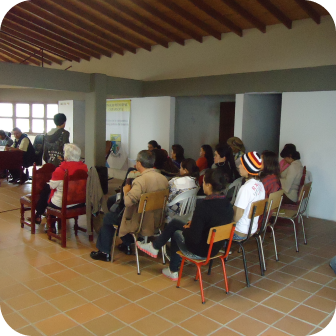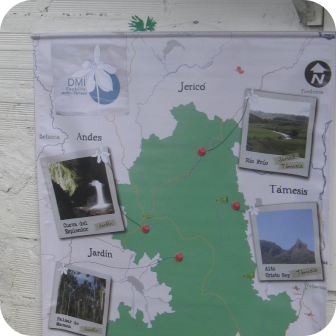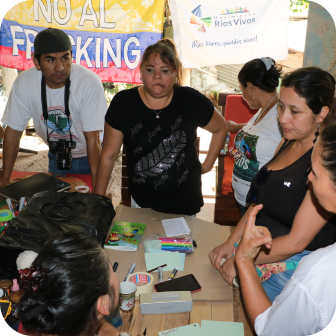Work strategies
Throughout our history we have worked from the construction and implementation of various strategies that go hand in hand with our institutional mission, because what they do is help us to realize the views and stakes we have on human relations and also with nature, understanding ourselves as part of it. These strategies are fundamental to guide our action in the territory, our relationship with peers, the creation of external materials, the formulation of projects and, in general, our relationship with other social actors.
Although the strategies have undergone adjustments or have had different emphases at different times, their axes have remained the same and are currently: accompaniment, pedagogy and training, research, advocacy and communication.

ACCOMPANIMENT
It is the way in which we work together with communities, organizations and articulations to generate shoulder to shoulder, strategies that, based on a dialogue of knowledge, allow us to resist the civilizing environmental crisis and an extractivist and hydroenergy model, as well as to build, strengthen and make visible alternatives to development.
Our accompaniment is based on horizontality, recognition of differences, respect for territorial autonomy, trust, empathy, humility, solidarity and closeness to collective subjects. We are present in the territory in order to come together to build with others, as well as to organize and mobilize in defense of the commons, since our work is based on the recognition of the need and potential of joint actions.
Our accompaniment is built in a double direction, so that we are both accompaniers and accompanied, generating a collective construction that generates learning for all those who participate in the processes.
PEDAGOGY AND TRAINING
The pedagogical processes developed by Censat Agua Viva are the set of reflections, practices, methodologies, tools, ethics and aesthetics that constitute our teaching-learning dynamics on the humanity-nature relationship, which are embodied in the Sustainability Schools.
These processes have the approach of Popular Environmental Education, EPA, which seeks to strengthen critical thinking, class awareness and strengthen the dialogue of knowledge about nature, contributing to the construction of popular environmentalism and the transformation of policies and ontologies that plunder the territories.
For the Schools, the territorial context is fundamental, the generation of agreements with organizations or communities, the joint creation of processes, actions and alternatives (as part of the accompaniment strategy), which are based on recognizing and respecting the beings (human and non-human) with whom we interact. In addition, the educational principles are based on the horizons proposed by intercultural, feminist, decolonial and intersectional pedagogies.
They are carried out to enable the emergence or strengthening of collective subjects, or to favor political subjects that wish to transform instrumental relations with nature and defend territories from extractivism, neoliberalism, and war.
Our accompaniment is built in a double direction, so that we are both accompaniers and accompanied, generating a collective construction that generates learning for all those who participate in the processes.


RESEARCH
Research at Censat Agua Viva has a transformative, socially and politically useful vocation. It is based on the recognition of diverse ontologies to generate knowledge and also to vindicate the role of all subjects in this task. We do research to strengthen accompaniment and training from diverse languages, critical and multidisciplinary approaches, as well as so that this knowledge built together can be used for communication and advocacy that will have an impact on territorial defenses.
The research is intended to achieve different objectives, among them to inform and alert about environmental debates at different scales, to produce knowledge, concepts and innovative analyses in a collaborative way, as well as to promote sustainable alternatives to face the current environmental crises and their challenges for the sustainability of life on the planet.
We understand research as a political and symbolic field in dispute, so we promote and position diverse research schemes, formats, networks and practices, as well as we defend that it is done from a non-extractivist ethic, which starts from pluriverses in dialogue and interconnected.
ADVOCACY AND POLICY
Our advocacy is an exercise through which, in coordination with communities, organizations, platforms, movements, unions and many other actors, we seek that people and institutions with decision-making capacity, whether governmental or not, can change or incorporate into their work agendas, discourses or definition of objectives, the views, positions, ideas or proposals of the organization.
Advocacy can be carried out with actors favorable or unfavorable to our points of view, with whom we seek to carry out articulation, reflection, debate and/or transformative action for the pursuit of environmental justice, either to persuade change or to reinforce or support their own positions. Thus, this political exercise is understood as a negotiation and consensus-building scenario that is not an end in itself, but rather obeys different objectives.
Although advocacy can be carried out in coordination with allies, it is not done among allies, but outwardly at the local, national and international levels.


COMMUNICATION
In Censat Agua Viva we assume communication as a transversal and priority field of action in all our work areas, which allows us to strengthen, share and position the mission, vision and political positions of the organization. It includes spaces and internal actions to strengthen our discursive unity, to appropriate a common language and to foster agreement on our common minimums, both conceptually and in terms of environmental struggles and political positions, as well as on how to communicate them.
Our communication should highlight the actions of territorial defense, research, advocacy and alternatives accompanied and/or generated by the organization. It is a critical communication that counteracts hegemonic discourses and generates proposals, opinions, arguments, to question and open dialogue with different actors, including those with whom we usually do not relate.
We also seek to foster dialogue and recognition of others, promoting a horizontal, collaborative and assertive relationship, in order to consolidate a rich and diverse communicative practice, with a strong transformative potential, integrating languages, voices, formats and varied media.
